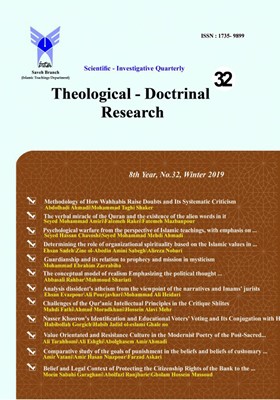-
-
List of Articles
-
Open Access Article
1 - Methodology of How Wahhabis Raise Doubts and Its Systematic Criticism
Abdolhadi Ahmadi دکتر محمدتقی شاکر -
Open Access Article
2 - The verbal miracle of the Quran and the existence of the alien words in it
Mohammad Amiri fatemeh mazbanpoor fatemeh mazbanpoor -
Open Access Article
3 - Psychological warfare from the perspective of Islamic teachings, with emphasis on the Qur'an and the views of the jurisprudents of Sunni religions
seyed hasan chavoshi seyed mohamad mehdi ahmadi -
Open Access Article
4 - Determining the role of organizational spirituality based on the Islamic values in enhancing organizational citizenship behavior in medical devises industry using DEMATEL
Ehsan Sadeh Zeinolabedin Amini Sabegh Alireza Nobari -
Open Access Article
5 - Guardianship and its relation to prophecy and mission in mysticism
Mohammad Ebrahim Zarrabiha -
Open Access Article
6 - The conceptual model of realism Emphasizing the political thought and behavior of Imam Ali
Abbasali Rahbar Mahmoud Shariati -
Open Access Article
7 - Analysis dissident's atheism from the viewpoint of the narratives and Imams' jurists
ehsan avazpoor Ali Pourjavhari Mohammad Ali Heidari -
Open Access Article
8 - Challenges of the Qur'anic Intellectual Principles in the Critique Shiites
Mahdi Fathi Ahmad moradkhani Hosin Alavimehr -
Open Access Article
9 - Nasser Khosrow's Identification and Educational Voters' Voting and Its Conjugation with Hajviri Opinions
Habibollah Gorgich -
Open Access Article
10 - Value Orientated and Resistance Culture in the Modernist Poetry of the Post-Sacred Defense Era from 1991 to 2011
علی ترحمی Ali Eshghi Abolghasem AmirAhmadi -
Open Access Article
11 - Comparative study of the goals of punishment in the beliefs and beliefs of customary law and Islamic teachings
Amir Vatani Amir hasan niaz poor Farzad Askari -
Open Access Article
12 - Belief and Legal Context of Protecting the Citizenship Rights of the Bank to the Iranian Administrative System
Moein Sabahi Garaghani Abolfazl Ranjbarie Gholam Hossein Massoud
-
The rights to this website are owned by the Raimag Press Management System.
Copyright © 2017-2026







